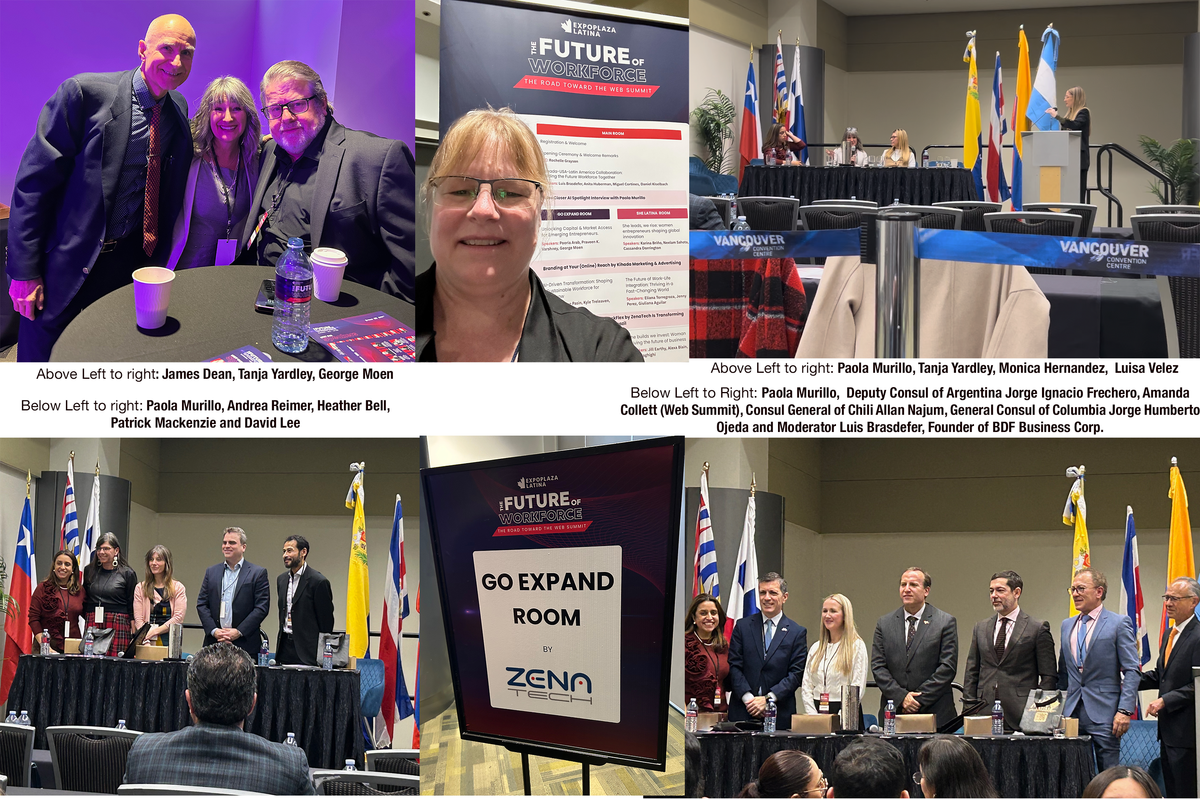
By Elke Porter | WBN News Vancouver | November 22, 2025
Subscription to WBN and being a Writer is FREE!
Yesterday's ExpoPlaza Latina 2025 at the Vancouver Convention Centre wasn't your typical business forum—it was a masterclass in confronting uncomfortable realities. Attending as a guest of World Referral Network's George Moen, I settled into four powerful panel discussions that left me questioning assumptions I didn't even know I had.
The day began with a session on upskilling and reskilling that immediately struck a nerve. As panelists discussed AI's role in education, the elephant in the room became impossible to ignore: are teachers even relevant anymore? My question haunted me throughout and that I was able to as was: where will AI take us, and how do we know when it's "done" when the technology changes so rapidly? The discomfort was palpable as we grappled with a future that feels simultaneously inevitable and unknowable.
They asked everyone in the audience if someone felt they were an "expert in AI" and mentioned that many people think they know a lot about AI, until they meet that person who knows more.
The second panel, "Beyond the Pitch," brought Monica Hernandez, Paola Murillo, and our good friend Tanja Yardley from Vancouver Island together to explore growth through collaboration and inclusion. Tanja demonstrated connection beautifully, literally engaging with the people beside her to show how authentic relationship-building trumps traditional networking. Their discussion reminded us that uncomfortable conversations about diversity and inclusion are precisely the ones we need to have. Tanja also talked about brain health and how important it is to understand the neurological foundations of human connection, reminding us that even in an AI-driven future, our brains are fundamentally wired for authentic human relationships.
The third session bridged policy and practice with Patrick MacKenzie, Heather Bell, and former Vancouver City Councillor Andrea Reimer tackling immigration head-on. This is where the discomfort peaked. The panelists exposed a troubling reality: the Immigration Minister has broad regulatory powers under the Immigration and Refugee Protection Act (IRPA) to issue instructions, public policies, and temporary measures without immediate parliamentary debate.
Meanwhile, meaningful structural policy reform crawls forward at glacial speed. We need more checks and balances. The system invites doctors to Canada only to relegate them to driving Uber because "Canadian experience" and "Canadian education" requirements create impossible barriers. Skilled immigrants bounce between countries every six months to maintain visa compliance, desperately wanting to stay but unable to secure stability. Neither immigrants nor employers hiring them have the certainty they need.
The final panel united Deputy Consuls from Argentina, Brazil, Chile, and Colombia alongside Web Summit's Amanda Collett to discuss strengthening the Americas through technology. While they shared exciting collaborative projects, their enthusiasm for Vancouver's 2026 World Cup hosting was noticeably muted.
Perhaps drawing from Brazil's 2014 experience, where heavy spending on host cities while schools and hospitals languished created widespread frustration with both the World Cup and soccer's governing body, the consuls raised concerns about balancing event prestige with community needs. Additional worries included potential conflict with the May 2026 Web Summit (forcing visitors to choose), and a harsh financial reality—their governments will only contribute funds to Vancouver and their consulates if their teams are assigned to play here rather than in Mexico or the USA. With team assignments announced December 5th, 2025, everything hangs in the balance.
What struck me most was how moderators consistently steered discussions toward hope. After acknowledging kids spending hours on phones, they highlighted organizations like "Unplugged" helping parents navigate digital challenges. Yes, AI disrupts, but it also eliminates boring, repetitive tasks, freeing humans for creative work. The immigration discussion reminded us that Canada remains a desirable destination—immigrants must choose us before we can choose them. And Latin America's thriving tech unicorns actively seek Canadian partnerships, positioning us as a gateway to innovation.
ExpoPlaza Latina 2025 positioned British Columbia as a vital bridge between Canadian and Latin American innovation ecosystems. But its greatest value wasn't in celebrating our potential—it was in forcing us to confront the uncomfortable gaps between our aspirations and our actions. Real progress demands we sit with that discomfort and do better.
Now it is time for other countries to set up the same kind of expo and ensure they are leading the young people to a knowledgeable and resilient future.
Elke Porter at:
Westcoast German Media
LinkedIn: Elke Porter or
WhatsApp: +1 604 828 8788.
Public Relations. Communications. Education
Let’s bring your story to life — contact me for books, articles, blogs, and bold public relations ideas that make an impact.
TAGS: #Expo Plaza Latina 2025 #Future Of Work #Canada Lat Am Innovation #Workforce Innovation #Vancouver Tech #Web Summit 2026 #WBN News Vancouver #Elke Porter


